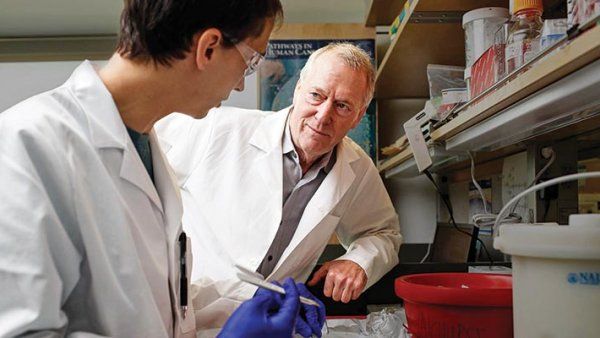Immune Cells in Brain Respond to Fat in Diet, Causing Mice to Eat
Immune cells perform a previously unsuspected role in the brain that may contribute to obesity, according to a new study by UCSF researchers.

University of California San Francisco
Give to UCSFImmune cells perform a previously unsuspected role in the brain that may contribute to obesity, according to a new study by UCSF researchers.

In the most comprehensive look yet at the safety of abortion, researchers at UCSF have concluded that major complications are rare, occurring less than a quarter of a percent of the time.

San Francisco children living in non-redeveloped public housing are 39 percent more likely to repeatedly visit emergency rooms, according to new research from UCSF and UC Berkeley.

Using weights obtained from over 100,000 Northern California babies, a new study is the first to detail the weight loss patterns of exclusively breastfed newborns.

In new research that brings natural movement by artificial limbs closer to reality, UCSF scientists have shown that monkeys can learn simple brain-stimulation patterns that represent their hand and arm position, and can then make use of this information to precisely execute reaching maneuvers.

Researchers at UCSF have identified patterns of genetic activity that can be used to diagnose endometriosis and its severity.

Drugs made from naturally occurring molecules found in fish oil could help thousands of Americans whose coronary and leg arteries renarrow after surgery.

Two major factors determine whether you get cancer – your genes and what you have been exposed to in the environment, says Allan Balmain, PhD, co-leader of UCSF’s Cancer Genetics Program.

Nonsmokers sitting in an automobile with a smoker had markers of significantly increased levels of carcinogens, indicating that secondhand smoke in motor vehicles poses a potentially major health risk.

Deborah Grady of the UCSF Clinical and Translational Science Institute presents six research trends that are helping accelerating cutting-edge science from the bench to the bedside.

A protein that may partly explain why human brains are larger than those of other animals has been identified by scientists from two stem-cell labs at UCSF.

Researchers at UCSF have launched SugarScience, a groundbreaking research and education initiative designed to highlight the most authoritative scientific findings on added sugar and its impact on health.

UCSF is unveiling a comprehensive cancer genetic testing program integrated with patients' electronic medical records, a major milestone in bringing precision medicine into everyday practice.

UCSF has unveiled a new cloud-based software platform that significantly advances precision medicine for cancer.

Genetically engineering tumors in mice, a technique that has dominated cancer research for decades, may not replicate important features of cancers caused by exposure to environmental carcinogens, according to a new study led by UCSF scientists.

Two major genetic studies of autism, led in part by UCSF scientists and involving more than 50 laboratories worldwide, have newly implicated dozens of genes in the disorder.

Scores of autoimmune diseases mysteriously cause the immune system to harm tissues within our own bodies. Now, a new study pinpoints the complex genetic origins for many of these diseases.

For the first time, researchers have found that exposure to radioactive iodine is associated with more aggressive forms of thyroid cancer, according to a careful study of nearly 12,000 people in Belarus who were exposed when they were children or adolescents to fallout from the 1986 Chernobyl nuclear power plant accident.

UCSF pathologist Charles Chiu answers some key questions about why the Ebola outbreak has spread so far, how it might be contained and what the real dangers are for people in the U.S.

California’s position as a leader in tobacco control is under threat, according to a new report from the UC San Francisco Center for Tobacco Control Research and Education.

New motor learning research suggests that "muscle memory" is actually something the brain is constantly relearning.

Sri Lanka has not reported a local case of malaria since October 2012. If it can remain malaria-free for one more year, the country will be eligible to apply to the World Health Organization for malaria-free certification.

A team of UCSF researchers has found that a tiny segment of genetic material known as a microRNA plays a central role in the transition from moderate drinking to alcohol use disorders.

An international research collaboration led by UCSF researchers has identified a genetic variant common in Latina women that protects against breast cancer.

Sugar-sweetened soda consumption might promote disease independently from its role in obesity, according to UC San Francisco researchers who found in a new study that drinking sugary drinks was associated with cell aging.

A newly discovered population of immune cells in tumors is associated with less severe cancer outcomes in humans, and may have therapeutic potential, according to a new UCSF study.

The molecular regulation of smooth-muscle contraction is an important determinant of airway responses during an acute asthmatic attack. In acute asthma, various triggers, including viral illnesses and aeroallergens, can cause acute narrowing of the airways leading to a life-threatening respiratory crisis and sometimes death.
